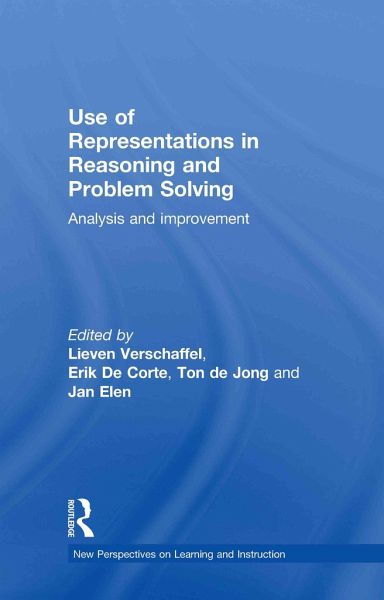
Use of Representations in Reasoning and Problem Solving
Analysis and Improvement
Herausgeber: Verschaffel, Lieven; de Jong, Ton; De Corte, Erik
Versandkostenfrei!
Versandfertig in 1-2 Wochen
186,99 €
inkl. MwSt.
Weitere Ausgaben:

PAYBACK Punkte
93 °P sammeln!
Within an increasingly multimedia focused society, the use of external representations in learning, teaching and communication has increased dramatically. Whether in the classroom, university or workplace, there is a growing requirement to use and interpret a large variety of external representational forms and tools for knowledge acquisition, problem solving, and to communicate with others. Use of Representations in Reasoning and Problem Solving brings together contributions from some of the world's leading researchers in educational and instructional psychology, instructional design, and mat...
Within an increasingly multimedia focused society, the use of external representations in learning, teaching and communication has increased dramatically. Whether in the classroom, university or workplace, there is a growing requirement to use and interpret a large variety of external representational forms and tools for knowledge acquisition, problem solving, and to communicate with others. Use of Representations in Reasoning and Problem Solving brings together contributions from some of the world's leading researchers in educational and instructional psychology, instructional design, and mathematics and science education to document the role which external representations play in our understanding, learning and communication. Traditional research has focused on the distinction between verbal and non-verbal representations, and the way they are processed, encoded and stored by different cognitive systems. The contributions here challenge these research findings and address the ambiguity about how these two cognitive systems interact, arguing that the classical distinction between textual and pictorial representations has become less prominent. The contributions in this book explore: how we can theorise the relationship between processing internal and external representations what perceptual and cognitive restraints can affect the use of external representations how individual differences affect the use of external representations how we can combine external representations to maximise their impact how we can adapt representational tools for individual differences. Using empirical research findings to take a fresh look at the processes which take place when learning via external representations, this book is essential reading for all those undertaking postgraduate study and research in the fields of educational and instructional psychology, instructional design and mathematics and science education.













